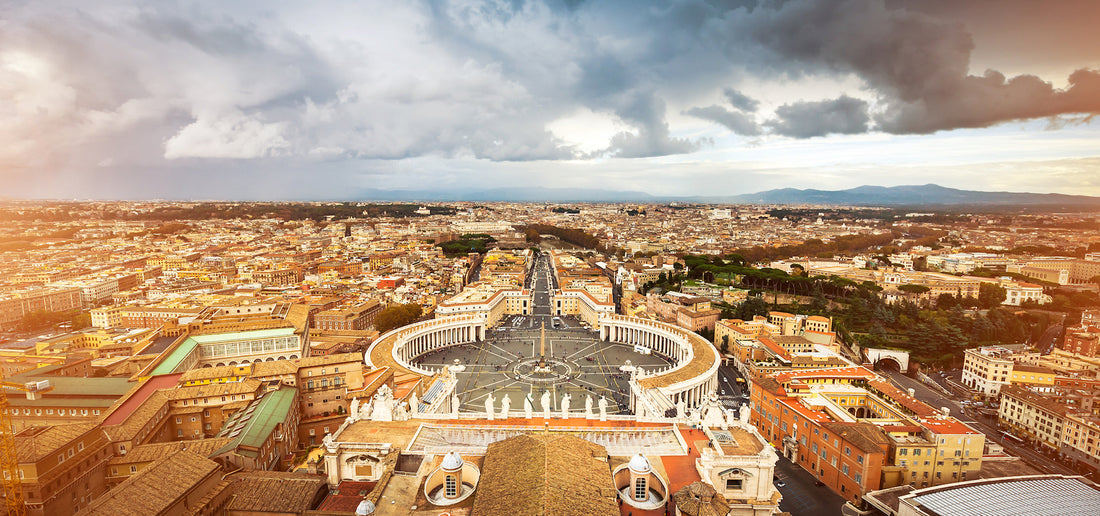If there is one thing that really makes me sick, it is Church rules and traditions. It is a religious spirit that wants to keep us bound by rules and laws that were never imposed by God. For the sake of this study, I am going to mention a few, but only for the purpose of making a point, not to encourage or emphasize them. The most remarkable and unsurprising result was and often still is that Church leaders want to make the Church, the body of Christ, dependent on them. This is basically seen in every denomination, from Catholic to Charismatic. And it is completely in conflict with the will of God. Listen, if we want the same power and results as the early Church, we better start to do what they did and leave every form of dependency on humans, whether they’re Church leaders or not.
A true Christian leader will ALWAYS point to Jesus and will ALWAYS help people to become dependent on Him, through His Holy Spirit. Anything else is deception and another spirit then the Holy Spirit. We are called to obey our leaders and pray for them, and I am not advocating any form of rebellion against authority. But when you find that the authority in your Church is making you dependent on leaders, when the leaders are standing between you and Jesus, then I have only one piece of advice: Run. Because as long as you are part of that Church, you are to submit to the authority. If that authority does not make you dependent on Jesus, then the only way is to remove yourself from that church so that you are no longer under that authority and do not have to rebel. Guard yourself and stay in line with the Word of God. Now, let’s dig in.
In the early Christian Church, believers lived out their faith through three daily practices: celebrating the Lord’s Supper, reading God’s Word, and anointing themselves with oil. These weren’t empty traditions but powerful acts of faith that connected people directly to God’s presence and strength. These practices, so you will, can be seen as ‘points of contact’ between the spiritual realm and your natural circumstances. They mirrored the spiritual pattern of the Old Testament temple—atonement (the Blood), cleansing (the Word), and empowerment (the Anointing)—and allowed every believer to experience God’s power without relying on religious leaders. By the 9th century, however, these practices were stripped away by manmade Church rules, driven by a desire for control, leaving the Church spiritually weak and dependent on Church leaders. This study explores the Biblical and historical evidence of how these practices were stolen, the devastating impact on the Church, and why bringing them back into daily life is essential for every believer—young or old—to restore the fullness of God’s power. This is a call to return to a vibrant, personal faith.
The Three Witnesses: God’s Design for Power
The Bible reveals a profound truth in 1 John 5:6–8: there are three witnesses in heaven—the Father, the Word, and the Holy Spirit—Who are One, and three witnesses on earth—the Spirit, the Water, and the Blood—that work together to bring God’s power into our lives. These earthly witnesses are spiritual realities, invisible but present, and we connect to them through practical acts of faith. Here’s what they mean and how they work:
- The Blood (Lord’s Supper): The Blood of Jesus cleanses us from sin and secures our victory over the enemy (Ephesians 1:7; Revelation 12:11). The Lord’s Supper is the tangible way we connect to this spiritual reality, remembering Jesus’ sacrifice and receiving His power (1 Corinthians 11:25). Jesus said, “Unless you eat the flesh of the Son of Man and drink His blood, you have no life in you” (John 6:53), showing its importance for spiritual vitality.
- The Water (God’s Word): The Water represents the cleansing power of God’s Word, which purifies our minds and builds our faith (John 15:3; Ephesians 5:26). The Word is like water in the temple’s laver, preparing priests to enter God’s presence (Exodus 30:18–20). Psalm 119:9 asks, “How can a young person keep their way pure? By living according to Your word” (Psalm 119:9). Even more, and this is the most important part, Jesus is the Word (John 1:1-5). Daily engagement with Scripture keeps us aligned with God’s truth, with Jesus Christ, and opens the door to His promises (Romans 10:17).
- The Spirit (Anointing with Oil): The Holy Spirit empowers us, bringing healing, deliverance, restoration, and boldness (Acts 10:38). Anointing with oil is the physical act that connects us to the Spirit’s power, a prophetic act of faith in His presence (Isaiah 61:3; Hebrews 1:9). In the Bible, oil was used daily by ordinary people to show God’s presence, favor and joy (Psalm 104:15; Matthew 6:17). It’s a faith-filled act that invites the Spirit to work in and through us.
These three witnesses—Blood, Water, and Spirit—work together like the temple’s pattern: atonement, cleansing, and empowerment. All three connecting us to one of the gifts and the Person of Jesus. Without the Blood, we can’t be forgiven. Without the Word, we can’t be purified. Without the Anointing, we lack God’s power. The early Church lived this pattern daily, but it was stolen, leaving believers disconnected from God’s strength.
The Spiritual and Natural Connection
The Bible teaches that the spiritual world runs parallel to our natural world. What happens in the spiritual realm becomes visible in the natural through faith. For example, Isaiah 53:5 says, “By His wounds we are healed,” not “we were” or “we will be” (Isaiah 53:5). This healing is already accomplished in the spiritual realm, and faith—built through God’s Word (Romans 10:17)—makes it real in our lives. The Lord’s Supper, reading the Bible, and anointing with oil are practical ways to tap into this spiritual reality as physical points of contact. They’re not magic; they’re acts of faith that align us with God’s power, as the early Church experienced through daily practice.
How the Practices Were Stolen
In the 1st–3rd centuries, these practices were central to Christian life, accessible to all believers, not just leaders. Historical and Biblical evidence shows their importance and how they were taken away.
1. The Lord’s Supper
- Early Practice: Early Christians broke bread daily in homes, which was the Lord’s Supper (Acts 2:46; Acts 20:7). The Didache (ca. 90 CE) describes prayers for communal meals, showing frequent celebration. Justin Martyr (ca. 150 CE) notes weekly gatherings but shows home-based practices were common (First Apology).
- Theft: By the 9th century, the Carolingian Reforms centralized worship, restricting the Lord’s Supper to Church services led by the leaders only. The Libri Carolini (ca. 790 CE) emphasized liturgical uniformity, discouraging home celebrations (Carolingian Reform), in most cases even forbidden. The Fourth Lateran Council (1215) limited laypeople to annual communion (Fourth Lateran Council). This made believers dependent on Church leaders, disconnecting them from the Blood’s power.
2. God’s Word
- Early Practice: Believers like the Bereans studied Scripture daily (Acts 17:11), using Greek or local translations. Early writings, like Clement of Rome’s letters (ca. 96 CE), show Scripture’s centrality in personal and communal life (1 Clement). Jesus Himself was very clear about this. Without His Word it is impossible to bear fruit as He asks of us. If His Word is not in us then we are not in Him. That makes us powerless and unpurified (John 15:1-8).
- Theft: The Church adopted Latin as the sole liturgical language by the 9th century, despite most people not understanding it. The Council of Tours (813 CE) allowed preaching in local languages but kept Scripture in Latin (Council of Tours). The Council of Toulouse (1229) banned laypeople from owning Bibles, citing heresy risks (Council of Toulouse). This cut believers off from the Word’s cleansing power, making them reliant on Church leaders.
3. Anointing with Oil
- Early Practice: Anointing was a daily habit for Jews and early Christians, showing joy, favor, and the Holy Spirit’s presence. Matthew 6:17 shows Jesus instructing disciples to anoint their heads while fasting to blend in, proving it was a daily norm (Matthew 6:17). If they stopped anointing, it signaled fasting or mourning, as seen in 2 Samuel 14:2 and Daniel 10:3. Psalm 104:15 praises oil for making the face shine, and Ecclesiastes 9:8 urges, “Let your head never lack oil”. Mark 6:13 records disciples anointing the sick, and James 5:14 extends this to elders, but personal use was widespread. The Apostolic Tradition (ca. 215 CE) describes believers bringing oil to services for blessing, then using it at home daily. For more info, read the book ‘The Anointed Bride’.
- Theft: The Carolingian Reforms restricted anointing to Church leaders for sacramental use, mainly for the sick, as seen in the Gelasian Sacramentary (ca. 750 CE). By the 11th century, anointing was limited to the dying (“Extreme Unction”), and personal use was banned. The Council of Trent (16th century) formalized this, reserving oil for Church leaders only. Once again, it left people depended on Church leaders and severed believers from the Spirit’s empowerment. Are you starting to see the pattern here?
The Driving Force: Control and Corruption
Forbidding these three things did one extremely damaging thing: It placed Church leaders between the people and God, trying in every way to make a direct connection impossible. The theft was driven by a desire for control, which the Bible warns against as a form of manipulation (Galatians 5:1). Church leaders, influenced by political alliances with the Carolingian Empire, centralized power to maintain authority, mirroring the religious and political forces that opposed Jesus (Matthew 23:13–15; John 19:12–15). By restricting these practices, they made believers dependent on themselves, undermining the priesthood of all believers (1 Peter 2:9). The enemy used this to weaken the Church, as a powerless Church poses no threat (2 Timothy 3:5).
The Impact: A Powerless Church
The loss of these practices and this devilish quest for control had profound consequences:
- Lord’s Supper: Without daily communion, believers lost connection to the Blood, weakening their victory over sin and Satan (Revelation 12:11).
- God’s Word: Without access to Scripture, believers couldn’t be cleansed or grow in faith, leaving them vulnerable to deception (Hosea 4:6).
- Anointing with Oil: Without personal anointing, the Holy Spirit’s power faded, reducing miracles and boldness (Acts 4:31).
- Dependency on Leaders: Believers relied on Church leaders only for spiritual life, contradicting the direct access God intended (John 16:13).
- Empty Religion: The Church became a shell, focused on rules rather than faith, like the Pharisees Jesus rebuked (Matthew 23:27).
By the Great Schism (1054) and Reformation (16th century), these practices were largely forgotten and the Church members were easy to manipulate. Even the Catholic Church’s 20th-century reversal (Vatican II) only restored anointing for the sick, not daily personal use. Many modern Churches still limit or ignore these practices due to ignorance or tradition.
Why Restoration Matters
Bringing back these practices isn’t about following rules—it’s about living out faith like the early Christians. They restore our direct connection to God and unleash His power. Do you believe it?
1. Direct Connection to God
The Bible calls all believers priests (1 Peter 2:9), meaning we don’t need middlemen to reach God. The Lord’s Supper, God’s Word, and anointing with anointing oil let us experience His presence directly. John 16:13 promises the Holy Spirit will guide us into truth. Anointing, in particular, invites the Spirit’s power without reliance on leaders, breaking the control that weakened the Church. It doesn’t mean we don’t need leaders or teachings, it means we are not to rely on Church leaders or their teaching, without testing it ourselves (1 Johannes 2:27).
2. Unleashing God’s Power
Each practice taps into a spiritual witness:
- The Blood (Lord’s Supper) secures forgiveness and victory (Ephesians 1:7).
- The Water (God’s Word, Jesus Himself) cleanses and builds faith (Ephesians 5:26).
- The Spirit (Anointing) empowers us for healing, deliverance, restoration, and boldness (Acts 10:38; Isaiah 10:27).
Together, they follow the temple’s pattern, the pattern of Heaven even, making God’s power real in our lives, as seen in the early Church’s miracles (Acts 4:31). For the earthly temple was made in the image of Heaven.
3. Breaking Free from Control
Church rules created dependency, but these practices empower every believer. Anointing with oil, especially, was a daily act that declared God’s favor and Spirit, not restricted to leaders (Psalm 104:15; Matthew 6:17). Restoring them frees us from human and demonic control and aligns us with God’s design.
4. Living Like Jesus
Jesus modeled these practices. He broke bread with disciples (Luke 22:19), taught the Word (John 15:3), and was anointed by the Spirit (Acts 10:38). His disciples anointed daily, even during fasting, to show normalcy (Matthew 6:17). Following His example means living a faith-filled life, not a rule-bound one.
Addressing Objections
- Objection: These are religious rituals.
- Response: Done in faith, they’re acts of trust, not legalism (Romans 14:23). Jesus modeled them as natural expressions of faith.
- Objection: Personal use lacks oversight.
- Response: Now that is exactly the point. Believer are supposed to be free of control. All believers are priests with direct access to God (1 Peter 2:9). Early Christians practiced these freely (Acts 2:46).
- Objection: Anointing is only for the sick.
- Response: Scripture shows daily anointing for joy and consecration (Psalm 104:15; Ecclesiastes 9:8; Matthew 6:17), not just healing.
How to Restore These Practices
Here’s how anyone—young or old—can bring these practices back:
- Lord’s Supper: You don’t have to do it formally or according to rules. Simply take a piece of bread and wine (or grape juice). Say the blessing over it in Jesus’ name. Thank Him for His body and eat the bread. Thank Him for His blood and drink the wine. That’s all. Don’t make it complicated, but let it be a simple act of obedience and dependence on Him.
- God’s Word: Ask Jesus to reveal Himself to you. Read the Word of God. Don't just read it, but start meditating on it. Ask God what He wants to say with this (Psalm 119:18). Thank Him for His Word. Do this daily.
- Anointing with Oil: Get anointing oil (or olive oil), apply it to your head and simply say, “In the mighty name of Jesus Christ.” Thank the Holy Spirit for His presence in your life and for helping you become more like Jesus each day. This was normal practice for early Christians (Matthew 6:17; Apostolic Tradition).
The enemy used corrupt leaders in the 9th century to steal the Lord’s Supper, God’s Word, and anointing with oil, making believers dependent on themselves and robbing the Church of its power. Make no mistake, the same thing still happens today in many Churches. These practices—rooted in the three witnesses of 1 John 5:6–8—connect us to Jezus’ Blood, Word, and Spirit, unleashing His strength in our lives. Restoring them isn’t about religion but about living a faith like Jesus and the early Church. By celebrating the Lord’s Supper, reading the Bible, and anointing daily, we break free from control, reconnect with God, and see His power—miracles, healing, and boldness—flow again. Let’s follow Jesus’ example and live the powerful life God intended.
Talk About It:
- How do these practices help you feel closer to God?
- What might stop you from trying them, and how can you overcome that?
- How could these habits change your life or your community?
Key Scriptures:
- Lord’s Supper: John 6:53; Acts 2:46; 1 Corinthians 11:25
- God’s Word: Psalm 119:9; John 15:3; Ephesians 5:26; Hosea 4:6
- Anointing: Psalm 104:15; Ecclesiastes 9:8; Matthew 6:17; Mark 6:13; James 5:14; Isaiah 10:27; Isaiah 61:3
- Three Witnesses: 1 John 5:6–8; John 1:1–5; Romans 10:17









